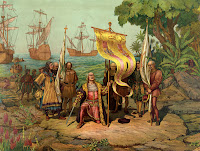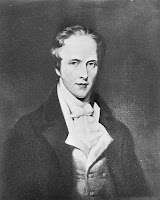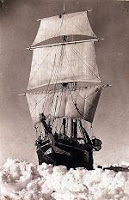In honor of Columbus Day, I thought I’d celebrate all the Regency era explorers I could find. Problem was, I couldn’t find many!
The Nineteenth Century is touted as history’s most active period of Earth exploration. Its accomplishments are described as “amazing.” Read this quote from BookRags.com:
Never before or since has so much of Earth been discovered in such a brief period of its history. In all, man’s compulsion to discover, describe, and catalog his world—as well as conquer it—resulted in a flood of exploration in the 1800s.
Most of this remarkable exploration and discovery took place before or after the Regency (1811 −1820). The first deep sea explorations, voyages and explorations of South America (including Darwin’s), exploration of Antarctica, Siberia and Australia.
So what exploration occurred in the Regency?
1811 – Two Portuguese explorers completed the first crossing of the African continent. Of course, their venture started nine years earlier. Golovnin, a Russian naval officer, explored the Kuril Islands, but he was captured by the Japanese.
1812 – Scottish settlers establish Red River Colony in what is now Manitoba, a colony started by the Earl of Selkirk to relieve Scotland’s Highland poverty. Selkirk spent his whole fortune in his effort to help his Canadian settlement. He died in 1820.
1813 – Surveyor George W. Evans leads an expedition into the interior of New South Wales, becoming the first European to cross the Great Dividing Range.
1816 – Captain James Tuckey, Royal Navy, is sent on an expedition to discover the end point of the Niger River, but he and his party die from yellow fever.
1817 – The Russian Golovnin, now freed by the Japanese, completes his charting of the Kuril Islands.
1818 – Scottish explorer John Ross discovers red snow cliffs overlooking Baffin Bay, now called the Ross Ice shelf.
1819 – British explorer John Franklin undertakes a new expedition to locate a Northwest Passage but is poorly prepared. His party, devoid of sufficient supplies, resort to cannibalism, and Ross becomes known as “the man who ate his boots.”
1820 – The first British settlement of South Africa is established in a place called Grahamtown. Several attempts are made to penetrate the Antarctic Circle.
1821 – A Russian explorer, von Bellingshausen, makes the first sighting of land within the Antarctic Circle.
That’s about it!
I get cold just thinking about exploring Antactica. And I can’t imagine writing a hero who spent nine years trudging across Africa, although I’ll bet someone could make a great story about such a man.
I suppose one of the reasons there wasn’t more exploration during the years of the Regency was because lots of countries were fighting wars. The Napoleonic War, the War of 1812, even wars of Independence for Venezuela, Chile, Paraguay, and Columbia. War isn’t very conducive to exploration.
Do you have a favorite time of exploration? A favorite explorer?
Check in at Diane’s Blog for the announcement of my Sept. 30 website contest winner and last Thursday’s winner of a copy of Regency Improprieties.




Can I put in a good word for Lady Hester Stanhope? She wasn’t really an explorer, but she did interpedly go where no woman had gone before when she headed off dressed in her Turkish (man’s)clothes on a caravan to Palyrma. Though it was early 19th rather than 18th century, so not sure if this counts.
Like you, I was quite surprised to find there were so few explorers, I would have thought there would have been more, but maybe they were too busy fighting with each other?
How can I have forgotten Lady Stanhope? Of course, the HIStory sites I visited didn’t list her.
How about Joseph Banks? Most of his explorations were in the 18c but he remained a major influence, financing expeditions when ill health later in life prevented him from travel.
I find scientific exploration very interesting, like the early studies of the Galapagos Islands. While growing up, I enjoyed books and films about relatively modern explorer types like Jacques Cousteau and Thor Heyerdahl (hope I’m spelling that right). If they don’t have Regency counterparts it would be fun to invent them.
Janet, I stuck strictly to the official years of the Regency and Banks was not mentioned. There was lots of exciting exploration in the 1700s and early 1800s and it seems like Banks was a part of a lot of it, but during the Regency he was disabled by gout but still the president of the Royal Society.
Elena, I think we’d have to invent Regency explorers! There were so few.
Yes. War and morning visits! Not conducive to exploration. And what bonnet does one wear on exploration?! Tee hee! I’d hate to imagine Regency women, even the intrepid Elizabeth Bennet, trekking into the wilds of the dark continent! 🙂
It’s an intriguing idea, bettielee!
No real favorite time of exploration. Lady Stanhope and her ilk have always been favorites.
I think the period of archeological exploration is what interests me most. This started about the Regency time period. Napoleon sent an expedition to Egypt to explore the tombs. Digs in the mediterranean area uncovered many sites and started opening doors to lost civilizations.
Sacagawea 🙂 (She fits the time period.)
I loved that fictionalized book about her life.
Librarypat, Napoleon’s excursion to Egypt certainly had important repercussions!
Janegeorge, Sacagawea’s participation with Lewis and Clark, certainly important, took place before 1811!
I tell you, not much exploration went on in the Regency!